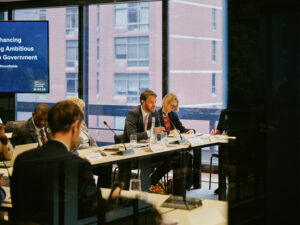Co-Chairing the Open Government Partnership—What is it Like, Really?
After a whirlwind of a year, my role as civil society Co-Chair of OGP recently came to an end. As Co-Chair with the Government of Kenya, it was a year of incredible progress but also many challenges—and plenty of learning. For me it also included inspiring breakfasts with digital activists, co-creating ideas with Liberian young people, getting to know the other incredible Steering Committee members, and much more!
First, let me touch on the formal progress. We set out an ambitious Co-Chair agenda and pushed hard towards its aims. Our work included working to grow political leadership for the Partnership through a ministerial-level gathering of governments, donors, and partners on the sidelines of the UN General Assembly; driving OGP forward as an action-oriented platform (90 commitments, 17 local action plans, and 30 unique localities submitted at least one commitment during our Co-Chair term); pushing OGP members to be more ambitious than ever through the Open Gov Challenge, which has led to potentially transformative efforts in areas including civic space, anti-corruption and justice; and strengthening the Partnership by recruiting new Co-Chairs, a new CEO, bringing in new Steering Committee members from around the world, and implementing the recommendations of the governance review. This was all a huge team effort, of course, thanks to the support of other Steering CommitteeThe Steering Committee is OGP’s executive decision-making body. Its role is to develop, promote and safeguard OGP’s values, principles and interests; establish OGP’s core ideas, policies, and ru... members, the OGP Support UnitThe OGP Support Unit is a small, permanent group of staff that work closely with the Steering Committee and the Independent Reporting Mechanism to advance the goals of the Open Government Partnership...., and the larger OGP community of reformers around the world.
But what is being OGP Co-Chair like really? For those of you that might be interested (or even curious about being Co-Chair at some point!), let me pull back the curtain a little. It is hard, politically challenging, and relentless, but also dynamic, exhilarating and hugely rewarding. It requires a healthy dose of humility because there is always so much to learn, but also a strong set of values on which you can rely when things get tough. There were three lessons over the past year that I think are worth mentioning and are perhaps more broadly relevant.
First, it is all about people. We talk a lot about laws, rules, policies, and institutions in the open government space, and these are essential. But the creation, interpretation, and ultimately effectiveness of these formal mechanisms are the result of the people involved. One of the best parts of co-chairing OGP is the platform you are given to meet individuals in the community, through work in specific countries, recruitment processes, across the various governance bodies within the Partnership, or at conferences and events (on that note, sign up for the upcoming Asia Regional Meeting in February 2025!) Even a cursory glance at the kinds of people involved in OGP gives a sense of the inspiration around every corner. Building these networks and learning from others are energizing, but they also provide the glue that allows OGP to operate so successfully. The community is also very supportive as you learn and grow. I could not have managed in the role without the support of former Co-Chair Anabel Cruz, for example.
Second, political dynamics are changing at lightspeed. No surprise there, but when you are working within what is an inherently political and global partnership, you see the need to address these changes just as quickly. Over the course of the year, we thought about everything from how to address conflict in OGP member countries to dealing with youth-led protests globally. As Co-Chair, I found a good chunk of my time required connecting dots in different ways with support from Support Unit colleagues—developing agendas for meetings on these issues, coordinating with allies across the Partnership to support various approaches, and cheerleading where needed with different constituencies. The hard work of building an open government movement seems to be this: it is not always sexy, but it allows OGP to remain adaptive and useful to members when that is most needed.
Third, there is significant space to innovate within the OGP structures that exist. OGP has made some important changes to adapt its model over the past several years. For example, the creation and spectacular growth of the OGP Local program has been a source of many of the best open government innovations. At the leadership level, there is significant room to shape conversations, topics, and ideas. As Co-Chair, I always felt a sense of agency over the direction of the Steering Committee and as an equal partner to governments. This allowed me to push on issues that were important to community members, such as closing civic space. It is also unlike many other international processes that we at Accountability Lab have been part of, through which governments make decisions and civil society voices are very clearly considered secondary at best. Acting as Co-Chair of OGP provided a genuine ability to collaboratively find new ways to influence critical issues in places that matter.
All of that said, it continues to be a very difficult and dangerous time for open governance and advocates for greater transparency and accountability everywhere. But my time as Co-Chair of OGP has replenished my hope in the future, despite the challenges. OGP is now in the safe hands of Cielo Magno and the Government of Spain for the next Co-Chair year, and I’m looking forward to supporting them on the road towards the OGP Summit in Vitoria-Gasteiz in October 2025.
Blair Glencorse is an OGP Steering Committee member and civil society Co-Chair in 2023-24.


Leave a Reply